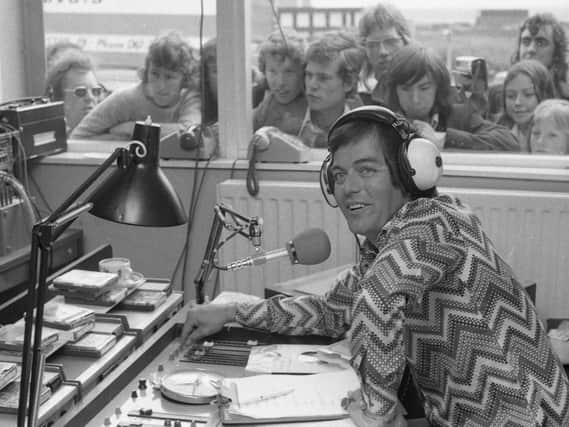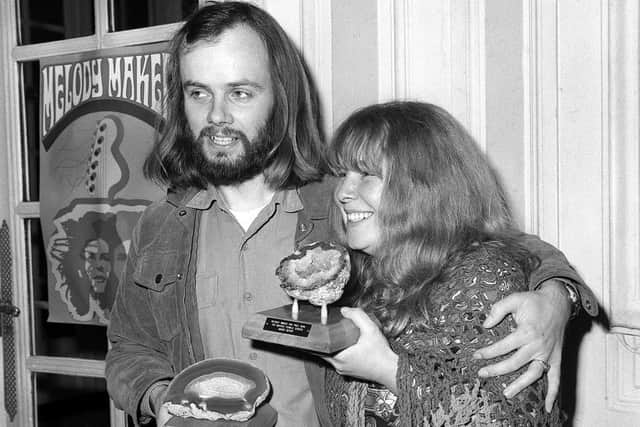Leeds-born author Robert Sellers' latest book explores history of BBC Radio 1 and 1960s pirate DJs


It’s perfectly logical that Leeds-born popular culture writer Robert Sellers should be releasing books about pirates.
He has carved out a career in biographies about the mad, bad and downright bonkers, particularly with his works on Hollywood raconteurs such as Peter O’Toole, a fellow Loiner.
Advertisement
Hide AdAdvertisement
Hide AdThis theme perhaps continues in his latest book, The Remarkable Tale of Radio 1, which among other topics explores how the 1960s pirate radio DJs forced a sea change in British broadcasting.


They were “literally pirates”, says Sellers, making shows off the shores – until the Marine Broadcasting Offences Act was drafted in early 1967 – but their popularity forced the Government to take action, asking the BBC to set up the station for pop and rock music, something the corporation initially resisted.
But it struck a chord, and its success continues today.
“Radio 1 was very important to people,” says Sellers. “Growing up in the 60s and 70s it was it was the soundtrack to a lot of people’s lives.”
Like many of his books, it’s likely the inspiration for this one struck Sellers during the daily dog walk – which may not be the most romantic vision of an author’s creative process, but when you’re a veteran of biographical writing and about 25 books in, it’s probably of fair enough.
Advertisement
Hide AdAdvertisement
Hide Ad“One is slowly running out of things but, you know, you Google things and you spend a lot of time walking the dog, thinking of ideas and then you come up with a great idea.
“And then you go into Amazon you type it in to see if anyone’s done it and someone’s written it 14 years ago or something.
“[That’s after] you get a great idea and you tell the wife ‘This is the one’.”
His previous works include Hellraisers: The Life and Inebriated Times of Richard Burton, Richard Harris, Peter O’Toole, and Oliver Reed, and The Battle for Bond.
Advertisement
Hide AdAdvertisement
Hide AdAmazingly, nobody had really done the history of Radio 1 in recent years, says Sellers.
“Curiously, that hadn’t been done before, which struck me as being quite strange because it’s one of those things that everybody heard about, because everybody, at one point in their life has listened to it.
“Successive generations as well. It means something different for different generations. For the oldies, it was the 60s and early 70s. And then, for the people growing up in the 80s. And then in the 90s and even now...”
His account takes in the station’s story from its inception in 1967 to 1995, including interviews with the likes of Johnnie Walker, Noel Edmonds and Paul Gambaccini.
Advertisement
Hide AdAdvertisement
Hide AdRadio 1’s founding came in the wake of the pirate radio scene of Radio Caroline and Radio London (not to mention Radio 270, which broadcasted off the coast of Scarborough).
The legacy of the pirates is such that Richard Curtis even made a film about it, The Boat That Rocked, released in 2009.
But once they moved ashore, Radio 1 was the place to hear them.
Sellers says: “I certainly remember listening quite casually in the 70s. It’s sort of tied in – the birth of Radio 1 which, is 1967 – sort of tied in with the people buying transistor radios.
Advertisement
Hide AdAdvertisement
Hide Ad“Transistor radios suddenly became really popular in the late 60s and 70s. So when you went into the garden and did a bit of gardening, you’d take the transistor out with you. And invariably, we put Radio 1 on because you want to listen to music. And alternatively you know on holiday when you’re on the beach, you take the transistor.”
In addition to offering the population music they wanted to hear, Radio 1 fostered generations of disc jockeys, many of whom moved over from the pirate stations.
While some struggled with the formality, others persevered and thrived. Sellers says: “The interesting thing about the DJs was just how popular they were...[now] it’s so fractured, there’s so many stations.
“But back then, there weren’t that many stations playing pop music, so the DJs were almost as big as the pop stars’ records they were playing.
Advertisement
Hide AdAdvertisement
Hide Ad“They were incredibly famous. People like Tony Blackburn and Noel Edmonds were probably the two biggest in the 70s and then you had Gary Davies in the 80s. But you know, they’d open shops and thousands of people would turn up. Thousands of people would turn up to watch them open a supermarket.
“Noel Edmonds told me a story. He was inside the shop and a policeman came in and said to the manager ‘You stop this now or we will give you 10 minutes to get rid of Noel Edmonds and stop it. Otherwise, I’m taking over because it’s chaos, I can’t hold anyone’. I think the front window went in as well.”
All of Sellers’ interviewees for the book were men, which reflects just how male-dominated the world of radio was for many years. However he did try to contact the likes of Annie Nightingale, the station’s first woman DJ.
Sellers says: “It was very male dominated and, you know, if you were a woman working at Radio 1 you were a secretary and that was it. And it was a very laddish culture was well, you know, there was disparaging things being said about women.”
Advertisement
Hide AdAdvertisement
Hide AdThe more sinister actions of men against women at such institutions are now better documented, and references to this are made in the book.
But for Sellers, who left Roundhay aged three and now lives in the St Albans area but comes back to see family, his writing topics are all about nostalgia. Next up will be a book on 1970s sitcoms, some which were filmed at Yorkshire Television, which he expects to be published later this year.
What might be completely foreign now to young readers, whose phones are connected around-the-clock to Apple and Spotify accounts, is the concept of “needle time”.
Recorded music could only be played for limited periods on the BBC because of agreements with Musicians’ Union and Phonographic Performance Limited. However, Sellers believes that led to the chat-savvy broadcasting personalities we know and love.
Advertisement
Hide AdAdvertisement
Hide Ad“Let’s say you have a two-hour show in the afternoon on Radio 1 and only sort of 40 minutes of that could be vinyl music,” says Sellers. Which I found really interesting because now it’s like people can’t understand why that was.
“That sort of led to getting personalities. A lot of Radio 1 DJs had to sort of talk. That’s why you had a lot of requests and people writing letters, and reading letters out and stuff, it’s because they couldn’t play a lot of music. And I think that created the sort of personality, the showbiz DJ. Not just the DJ today who just plays music – a DJ that had a personality.”
The Remarkable Tale of Radio 1: The History of the Nation’s Favourite Station 1967-95 By Robert Sellers is published by Omnibus Press and is available to buy now.
Peel gets cold shoulder
Robert Sellers’ latest book on Radio 1 is sprinkled with anecdotes about the conflicts between the pirate DJs and the old guard at the BBC.
Advertisement
Hide AdAdvertisement
Hide AdIn one such story, late veteran John Peel had some trouble even getting in to the building, in a memory told by Tony Brandon.
Sellers writes: “He presented himself in the garb of he day: shoulder-length hair, the obligatory kaftan and probably sandals or flip-flops – John wasn’t a man given to wearing shoes. ‘Excuse me, sir, can I help you?’ said one of these rather officious commissionaires. ‘Yes,’ said John. ‘My name’s John Peel’. ‘Oh, really, they all say that, sir.’ And they wouldn’t let him in.”
Peel had to ring his producer to “convince” them.